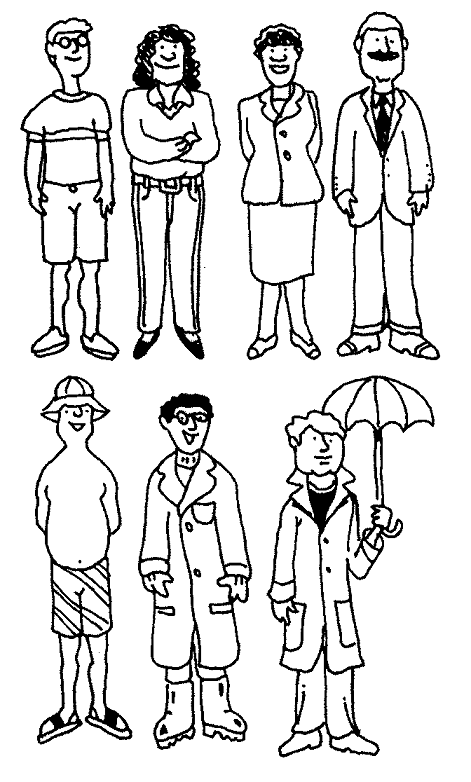Which of the following sentences contains parallel preposition phrases?
a) Living in town and working in the country, Louis spends a lot of time in his car.
b) Louis worked hard to make a living and to support his mother.
c) Louis cared for his mother and worked for the local supermarket.
C
You might also like to view...
¿Qué llevan? María is looking at a magazine and is telling her little sister the names of the items of clothing that they see. Write the name of twelve items of clothing you see.

What will be an ideal response?
El imperfecto. Completa el párrafo con el imperfecto de los verbos entre paréntesis. Cuando mi hermana 1. ________ (ser) joven, 2. _________________ (tomar) clases de guitarra, aunque (although) 3. ______________ (querer) tocar el piano. Lo que 4. _______________ (pasar) es que mi padre 5. _____________ (tener) una guitarra, pero no (nosotros) 6. _________________ (tener) un piano. Ella 7. ___________ (ir) a casa del profesor. Él siempre 8. _______________ (estar) practicando cuando ella 9. _____________ (llegar). Eso la 10. _______________ (inspirar) mucho.(3)
Fill in the blank(s) with the appropriate word(s).
Which of the following is the best place to start searching for sources and information?
a. Overview articles in a specialized encyclopedia b. The World Wide Web c. Books on the subject
The gist of the selection is that
Nancy Shippen was a product of Philadelphia’s best lineage. Born in 1763 as a privileged daughter of an upper-class family, her duty was to blossom into a charming woman, admired for her beauty and social graces rather than her intellect. Nancy’s education consisted of the refinement of skills that would please and entertain—dancing, cultivating her voice, playing musical instruments, painting on delicate china, and producing pieces of decorative needlework. Had Nancy shown any interest in politics, an exclusively masculine preserve, she would have shocked everyone, including her father, William Shippen. Shippen was a noted local physician who espoused independence in 1776, and where he led, his family followed. Indeed, he was a proud father in 1777 when, at his urging, Nancy displayed her patriotic virtue by sewing shirt ruffles for General Washington. Nancy had two male tyrants in her life. The first was her father. He forced her into marriage with Henry Livingston in 1781. Henry was the son of one of New York’s most powerful and wealthy families. The man she truly loved had only “honorable expectations” of a respectable income. So her father insisted that Nancy wed Livingston. The rejected suitor wanted to know “for what reason in this free country a lady must be married in a hurry and given up to a man whom she dislikes.” None of the Shippens responded. In truth, the answer was that Nancy legally belonged to her father until she became the property of the second tyrant in her life—her husband. The marriage was a disaster, most likely because Henry was an adulterer. Nancy eventually took her baby daughter and moved back to her family. She wanted full custody of the child, who by law was the property of her husband. Henry made it clear that he would never give up his legal rights to his daughter, should Nancy embarrass him in public by seeking a bill of divorcement. Even if she had defied him, divorce bills were very hard to get because they involved proving adultery or desertion. To keep actual custody of her daughter, Nancy accepted her entrapment and moved back with Henry. Several years later, however, Henry relented and arranged for a divorce, but by that time, Nancy’s spirit was broken. The former belle of Philadelphia society lived on unhappily in hermitlike fashion until her death in 1841. Having been so favored at birth, her adult years were a personal tragedy, primarily because of her legal dependence on the will of two men. A) Nancy Shippen was a victim of the privileged society of Philadelphia. B) education of women consisted of the refinement of skills that would please and entertain. C) during the late 1700s, women were legally dependent on the will of men.